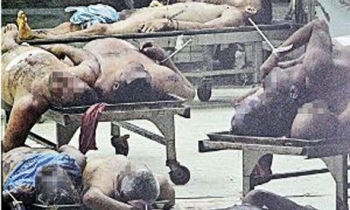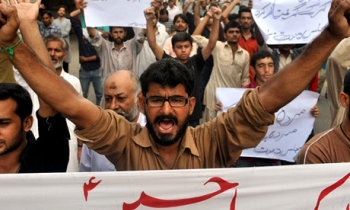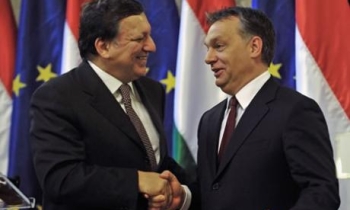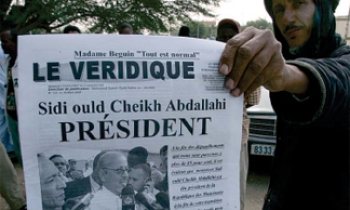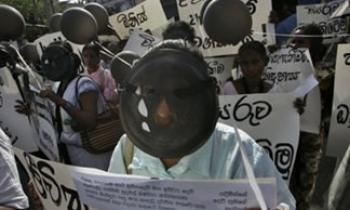Gambian authorities have flattered to deceive. After a token respite while playing host to the African Union summit, the Gambian government has once again started targeting the press. One journalist has not been seen since July 7, five days after the summit ended. He is believed to have been arrested, while another has gone into hiding fearing arrest, according to the Committee to Protect Journalists (CPJ).

"Chief" Ebrima B Manneh, of the pro-government Daily Observer, has been missing since July 7, according to local sources. Saja Taal, managing director of the Daily Observer, confirmed that Manneh had not been to newspaper's office in a week. One CPJ source and the Ghana-based Media Foundation for West Africa (MFWA) said he had been arrested by the National Intelligence Agency (NIA). Information Minister Neneh Mcdoll-Gaye told CPJ she had no information about Manneh's whereabouts.
Sulayman Makalo, former assistant editor at the shuttered Banjul-based newspaper the Independent, has gone into hiding for fear of arrest, according to local sources. They said Makalo was under threat because of his work for a new publication in Banjul, the Daily Express. The newspaper's first issue, published on July 1 at the start of the AU summit in the capital, reprinted a press release from a coalition of civil society organisations protesting the government's blocking of a forum on freedom of expression that had been scheduled to take place before the summit. On July 5, the Daily Observer printed a letter accusing the Daily Express of seeking "to tarnish the image of this country." Makalo has since left his position at the Daily Express.
Lamine Saine, an NIA investigator, denied that NIA was seeking to arrest Makalo. "We don't normally threaten [journalists] with arrest," he told CPJ. "We just call them and tell them come over, we want to discuss something with you." Saine denied that NIA had ever detained a journalist.
Four journalists have been imprisoned in NIA detention facilities this year, CPJ has confirmed after extensive research. One of them, Malick Mboob, a former journalist who was arrested on May 26, is still in NIA custody, though the agency has declined to account for his detention. Mboob's arrest and subsequent arbitrary detention came in the wake of a government clampdown on journalists whose names were published in the pro-government privately owned Daily Observer for allegedly sending damaging information to the online publication Freedom Newspaper.
The Independent's general manager, Madi Ceesay, and editor Musa Saidykhan were kept incommunicado in NIA custody for three weeks before being released without charge on April 20. Lamin Fatty, a reporter for the Independent, was held for over two months without due process or access to a lawyer. He was released on June 12, but faces trial for publishing "false news."

The paper has not been able to publish since security forces raided its offices on March 28 and Saidykhan has fled into exile in Senegal. He was also detained and interrogated previously on October 27, 2005. That detention is believed to have been in connection with questions he raised about the killing of prominent journalist Deyda Hydara.
"The government has waited for international attention surrounding the AU summit to fade before launching a new offensive against the already beleaguered press," said CPJ Executive Director Joel Simon. "The Gambia has become one of the worst places in Africa to be a journalist."
Journalists in the Gambia already face some of the harshest working conditions in Africa. One former journalist has been in custody without charge since May; a leading private newspaper was shuttered by security forces in March; and a reporter is on trial for publishing "false news," a criminal offense under Gambian law.
"It is time for Gambian authorities to stop this onslaught against the private press," Simon said. "Authorities must account for Manneh's whereabouts, publicly renounce all threats against the Daily Express, and allow The Independent to resume publishing. The government must release Malick Mboob or explain its reasons for holding him."
According to MFWA, the Daily Observer has no editorial freedom. Government officials daily censor the content of each edition before the newspaper goes to print. Stories deemed critical of government are removed and replaced with advertisements. This development, according to an MWFA source, has seriously curtailed the editorial independence of journalists working for the newspaper.
"Now, our writing is mostly about society but never the government," the source said. "We are frustrated and confused, we do not know what to include and what to leave out. At most we can describe problems, but can never criticise the government or make it look bad. Journalists who object to the acts of censorship are seen as opposition elements and threatened with dismissals or imprisonment."

The Daily Observer ceased to be an independent newspaper after the 1994 coup that brought Yahya Jammeh into office. Its publisher, Kenneth Y Best, a veteran Liberian journalist, was deported for allegedly criticisng the then military regime of Jammeh. Amadou Samba, a close associate of Jammeh is now owner of the newspaper whioch serves as a government propaganda tool to vilify members of the opposition.
On June 19, the Millennium Challenge Corporation (MCC), an organisation providing US congressional aid to countries that rule justly and encourage economic freedom, suspended the Gambia's suitability for assistance after "a pattern of actions inconsistent with MCC's selection criteria." The MCC board said it examined "documented evidence of human rights abuses and increased restrictions on political rights, civil liberties, and press freedom by the government." It said the Gambia would be reinstated if it took "tangible and significant actions to address the areas of decline and embrace political and economic reforms."
International Press Institute (IPI) Director Johann P Fritz welcomed the MCC's decision, and said, "It reflects a growing recognition that freedom of the press and an independent media are fundamental to sustainable development and fighting corruption, which is ruining so many Africans lives. In general, governments that fail to uphold these rights should not receive the benefit of assistance."
"Such a decision also makes sense for donors. A free press is an additional layer of insurance against corruption. Donors should not have to assist governments where, without the additional benefit of a free press, their money may be siphoned out of development projects and into the hands of corrupt officials and businessmen."
Fritz went on to say, "Regarding the Gambia, the situation has worsened in recent years with the government gaining an unenviable reputation for persecuting the independent media, imprisoning government opponents and undermining the rule of law. The murder in 2004 of the Point editor, Deyda Hydara, and the attacks on the Independent newspaper and its staff are particularly worrying."
"Given the extremely serious nature of these press freedom violations and the fact that the government appears unwilling to uphold the rights of ordinary Gambians, I believe that the African Union should think very carefully whether Banjul is a suitable venue for future summits. Governments with extremely poor human rights and press freedom records should not be seen to benefit through their association with inter-governmental organisations that are sworn to uphold these essential rights," said Fritz.

